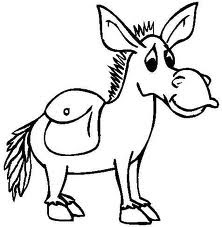A long time ago, there was an old man who had a donkey and a puppy. The donkey lived in a good stable and had very good food to eat. But the man made him do hard work everyday. The puppy lived in the house doing nothing. It liked to jump and sit on the old man's lap and it liked to lick the man's face. The old man would laugh joyfully and fed the puppy with cake and milk.
The donkey saw this and was jealous. The donkey began to compare himself with the puppy.
"I have to work very hard while the puppy plays all the time," the donkey thought. "If I behave the same way, perhaps the old man may like me too," the donkey thought. So the next morning, while the old man was eating his breakfast, the donkey walked into the house. He ran around the table and tried to lick the old man's face. As the donkey was bigger than the puppy, he knocked over and broke a jug full of water and a cup of honey. The old man was very angry. He picked up a big stick and hit the donkey. The silly donkey ran away in pain. The old man punished the donkey by not giving him any food. He had to stand in the sun and rain the whole day. "What a silly donkey I am!" From now, I will not do this again so that I will not be punished," he said to himself.
“Think before you leap.”
A long time ago, there was an old man who had a donkey and a puppy. The donkey lived in a good stable and had very good food to eat. But the man made him do hard work everyday.
นานมาแล้ว มีชายชราคนหนึ่งเลี้ยงลาและลูกสุนัขไว้อย่างละตัว ลาถูกจัดให้อยู่ในคอกที่ดี และมีอาหารดีๆ กินแต่ชายชราก็ให้มันทำงานมากมายทุกวัน
The puppy lived in the house doing nothing. It liked to jump and sit on the old man's lap and it liked to lick the man's face. The old man would laugh joyfully and fed the puppy with cake and milk.
ส่วนลูกสุนัขอาศัยอยู่ในบ้าน โดยที่ไม่ต้องทำอะไรเลย ลูกสุนัขมักกระโดดขึ้นไปนั่งบนตักของชายชราแล้วชอบใช้ลิ้นเลียหน้าของเขาชายชราจะหัวเราะชอบใจ แล้วให้ขนมเค้กและนมกับลูกสุนัข
The donkey saw this and was jealous. The donkey began to compare himself with the puppy. "I have to work very hard while the puppy plays all the time," the donkey thought. "If I behave the same way, perhaps the old man may like me too," the donkey thought.
เจ้าลายืนมองเหตุการณ์ที่เกิดขึ้นในบ้านด้วยความริษยา มันเริ่มเปรียบเทียบตัวเองกับลูกสุนัข "ฉันต้องทำงานหนักในขณะที่เจ้านั่นเอาแต่เล่นสนุก" มันคิดในใจ "ถ้าฉันทำกับนายอย่างนั้นบ้าง นายก็คงจะชอบใจเช่นกัน" มันคิดต่อ
So the next morning, while the old man was eating his breakfast, the donkey walked into the house. He ran around the table and tried to lick the old man's face.
ดังนั้นในเช้าวันรุ่งขึ้น ขณะที่ชายชรากำลังกินอาหารเช้าอยู่เจ้าลาก็รีบเดินตรงเข้าไปในบ้าน มันวิ่งไปรอบๆ โต๊ะ แล้วพยายามตะกายเอาลิ้นเลียใบหน้าของชายชรา
As the donkey was bigger than the puppy, he knocked over and broke a jug full of water and a cup of honey.
แต่เพราะลาตัวใหญ่กว่าลูกสุนัข มันจึงชนเหยือกน้ำและถ้วยบรรจุน้ำผึ้งตกลงมาแตก
The old man was very angry. He picked up a big stick and hit the donkey. The silly donkey ran away in pain. The old man punished the donkey by not giving him any food. He had to stand in the sun and rain the whole day. "What a silly donkey I am!" From now, I will not do this again so that I will not be punished," he said to himself.
ชายชราโกรธมาก เขาจึงไปหยิบไม้เรียวอันโตมาตีเจ้าลาตัวนั้น เจ้าลาโง่วิ่งหนีด้วยความเจ็บปวด มันยังถูกชายชราลงโทษโดยไม่ได้กินอาหาร และต้องยืนตากแดดตากฝนอยู่นอกคอกตลอดวัน "ข้าช่างเป็นลาที่โง่เขลาอะไรอย่างนี้ ต่อไปข้าจะไม่ทำเช่นนี้อีกจะได้ไม่ต้องถูกลงโทษแบบนี้" มันบอกกับตัวเอง
นิทานเรื่องนี้สอนให้รู้ว่า
“Think before you leap.”
“ก่อนลงมือทำสิ่งใด ควรคิดไตร่ตรองให้รอบคอบเสียก่อน”
คำศัพท์น่ารู้ (Vocabulary)
donkey (n.) = ลา
puppy (n.) = ลูกสุนัข
stable (n.) = คอก
lap (n.) = ตัก
joyfully (adv.) = ชอบอกชอบใจ
feed (v.) = ป้อน
jealous (adv.) = อิจฉา
compare (v.) = เปรียบเทียบ
hard (adj.) = ทำงานหนัก
lick (v.) = เอาลิ้นเลีย
stick (n.) = กิ่งไม้
silly (adj.) = โง่เขลา
punish (v.) = ลงโทษ



